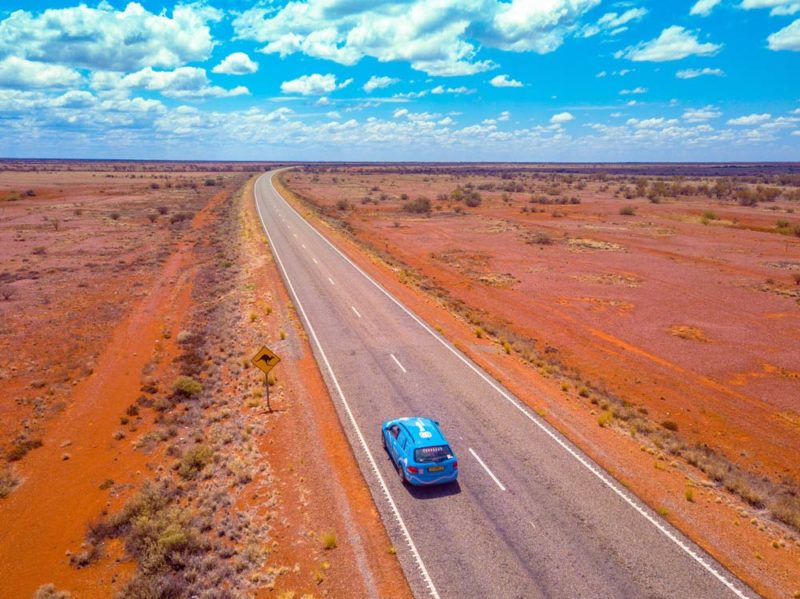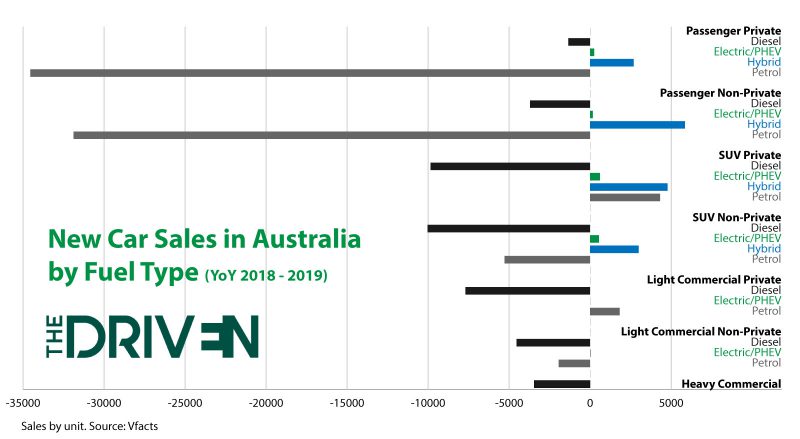"Im hoping to get another 3-4yrs out of my Nissan Pulsar. By then AVZ will give me just enough to change over to a EV. I would do it now, for the environment, if I could afford it"
Same here PD2, I'm in the same Boat atm, and i don't think we're the Only ones, as
In Australia, a 21 month decline in petrol and diesel sales is also persisting, while electric vehicles sales have doubled over the past 12 months and market analysts saying that drivers could be waiting for more electric vehicle choice before turfing their old vehicles.
The global transition to electric mobility will see Bosch knuckle down as it overhauls its business to move away from internal combustion engine (ICE) industry to accommodate the new, clean electric vehicle industry.
Electrics and hybrids the shining lights in bleak year for petrol, diesel car sales

Wiebe Wakker drives a converted electric Gold across Australia. Supplied
Perhaps 2019 could go down as the year when the transition to electric vehicles started to take shape in Australia.
Like the rooftop solar industry a decade earlier, sales of electric and hybrid vehicles remain low – but there is a definite trend here and every reason to believe that the uptake of EVs will be quicker over the next decade than even that of rooftop solar over the last 10 years.
Official data for calendar 2019 released by the Federal Chamber of Automotive Industries tells what is becoming a familiar story: Sales of petrol and diesel cars are plunging, down 7.8 per cent from the previous year to the lowest level since 2011.
The story that goes with it is the same: the FCAI blames everything from slower wages growth, tight lending, exchange rate movements and even “the extreme environmental factors our country is experiencing.”
What it doesn’t highlight, but what is clear from its data, is the strength of the electric and hybrid markets, the only two sectors that have enjoyed substantial sales growth over the past year, a story that is likely to be repeated until fossil fuel vehicles become a rare offering in the new car market.
According to the FCAI data, sales of new light vehicles fell 7.8 per cent to 1.06 million in 2019, with the passenger car market particularly badly affected with a 16.5 per cent slump. Even SUV’s, now the most popular market segment, fell by 2.4 per cent.
The sales of plug-in vehicles – both fully electric and plug in hybrids, and totalled around 3,000 for the year, doubling their sales from the previous years.
The number of electric and plug in passenger cars jumped by two third from 646 to 1066, while the numbers of new SUV plug-ins and electric sales nearly trebled to 1837 from 690.
These sales of passenger and plug-in electrics do not include Tesla, and the total sales of new electrics and plug ins would be more than double the FCAI number if they were.
New Car Sales in Australia by Fuel Type (YoY 2018 – 2019). Does not include Tesla sales. Data source: Vfacts
It is thought that Tesla likely sold about 2,000 new vehicles throughout the year, mostly from the Model 3 sedan that arrived in late August.
Of the other fully electric offerings itemised by the FCAI data, the new Nissan Leaf sold 408 vehicles, the Jaguar i-Pace lifted sales to 155 from 39, while the sales of the older models such as the BMW i3 fell from 115 to 96, while sales of the Renault Zoe fell from 48 to 5.
Hyundai told The Driven that it sold 500 electric Kona SUVs in 2019, and 546 Ioniq – of which 352 were fully electric, 123 were plug in hybrids and just 71 hybrids. That’s an interesting result from the only model that has a choice of three different options.
Mitsubishi also told The Driven that sales of the Outlander plug in hybrid nearly doubled in 2019, from 370 in 2018 to 700 last year, while overall sales of Outlanders increased around 11 per cent to 15,573. Again, an interesting trend.
The straight hybrid market (not plug ins) was dominated by Toyota, with sales in 2019 led by Corolla (10,597), Camry (8,696) and RAV4 (7,411).
As The Driven has reported on many occasions over the past year, and has been highlighted by a growing number of surveys – it’s not just the new car sales which point to the trend, it is the decision by many car buyers to hang on to their petrol and diesel cars for longer while they await an EV they like and can afford.
The choice to date has been limited and pricey. The number of offerings will more than double in 2020, albeit from a small base and remain a fraction of the choice that can be found in Europe.
But with eight new models arriving some time this year, and more to follow as the big car manufacturers deliver on their commitment to switch to fully electric vehicles in coming years, it seems certain that the sale of electrics will at least match those of fossil fuel vehicles by the end of the decade.
Hopefully, the federal government, and state authorities, can begin to frame policies that at least allow for that transition to occur, and possibly to hasten it.
The federal Coalition has promised to release its EV strategy in 2020.
Until now, it has been highly critical of Labor’s policy to aim for a 50 per cent share of new car sales by 2030, declaring it to be the end of the weekend.



It said something similar about labor’s 50 per cent renewable energy target, and has now quietly assumed the same ratio in its emission reduction plans. Technology will drag it into the future.
https://thedriven.io/2020/01/13/ele...ts-in-bleak-year-for-petrol-diesel-car-sales/
Well, if that doesn't tell you where we're headed and in what direction ( EVentually ) then Nothing will, even "Blind Freddy" can see that imo.



Just one of the many reasons why i'm Not prepared / going to update my perfectly good 2012 Hyundai IX-35 with Only 30,000 k's on it to something else just yet, even though i'd like to, have been considering it e.g. - Twin Cab or Ute, since i moved out to the live in the Bush, when in a few years time, there should / will be Not Only a greater choice of EV's to choose from here in Aus, but Hopefully Cheaper as well, as Sales Grow Year on Year, well, that's the Plan atm anyway.
https://thedriven.io/ev-models/
Then again, I wouldn't mind one of these,
Mercedes-Benz all-electric EQC has beaten all other competitors – including the Tesla Model 3 and a host of petrol and diesel competitors – to win a leading car of the year award.
The EQC was chosen by seven judges of the 2020 Wheels Car of the Year over 30 other finalists, credited it for living up to its WLTP-rated 353km driving range and ticking the luxury box for which Mercedes-Benz is known. It is, however, the first time the brand has won the award un 12 years.
One judge even went so far as to say it is the best car Mercedes-Benz has ever made. And this writer can certainly attest to the high end experience – with a smooth take off characteristic to electric vehicles combined with the new Mercedes-Benz MBUX user experience.
It’s not the first time an all-electric car has won the award – in 2014, the BMW i3 beat a strong line up of contenders including the Tesla Model S.
Judges said they were impressed by the Tesla Model 3’s “impressive and game-changing real-world functionality, along with advanced technology, and a ultra-competitive price”.
https://thedriven.io/2020/01/31/mer...beats-model-3-to-win-top-australia-car-award/
GLTAH
Cheers
Frank
- Forums
- ASX - By Stock
- AVZ
- Running discussion on SP
Running discussion on SP, page-25368
-
- There are more pages in this discussion • 57,278 more messages in this thread...
You’re viewing a single post only. To view the entire thread just sign in or Join Now (FREE)
Featured News
Add AVZ (ASX) to my watchlist
Currently unlisted public company.
The Watchlist
I88
INFINI RESOURCES LIMITED
Charles Armstrong, CEO
Charles Armstrong
CEO
SPONSORED BY The Market Online





